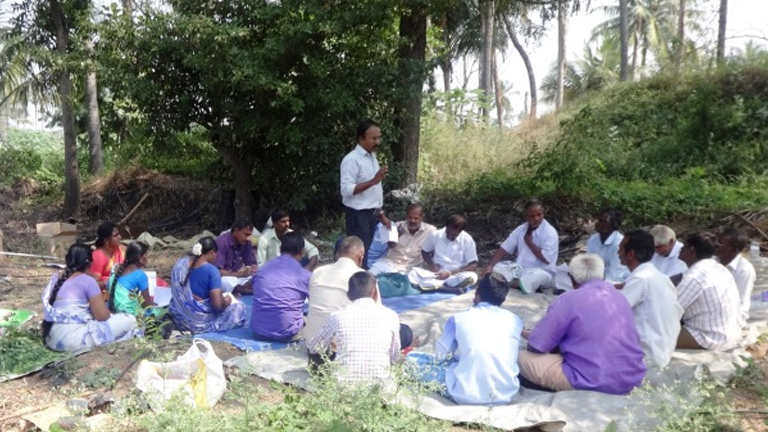‘Plant Clinics’ to Bridge the Extension Gap in Plant Health Management
Dindigul, Febrauary 2018: Complementing the Agricultural extension system in Kannivadi, Dindugul district is a group of women and men farmers who go about diagnosing pest and diseases in crops and offering real time solutions on field. The presence of these ‘plant doctors’ in Kannivadi is the outcome of a plant clinic training organised by MSSRF with support from NABARD. Crop loss due to pest and disease is a major concern in the region. An estimate by the Tamil Nadu Agricultural University puts crop loss from pest and disease attack in the range of 20 to 73%.
Access to quality and timely advisory system for diagnostic services on plant health to small holders is critical to reduce crop losses from pests and diseases. The farmers largely depend on pesticide dealers for pest and disease diagnosis and advisory services, result in increased and indiscriminate usage of chemical insecticides and fungicides. Ultimately it leads to increased cost of cultivation and damage the health of the ecosystem. To address the issue, MSSRF is involved in building the local capacities by training a cadre of para professionals as ‘plant doctors’. In the current phase, 25 men and women farmers are selected and undergoing training on pest and disease diagnosis and management with specialization in vegetable crops that are cultivated in the region. This training is to be extended to farmers across the region in the coming months.
They were designated as village level ‘plant doctors’, their main role is to extend support to farmers on pest and disease diagnosis and promote adoption of integrated pest and disease management practices. Such services are not adequately reaching small holders under extension serives. In this back drop, the ‘plant doctors’ are expected to complement the gap in plant health management. As a long term outcome, the initiative is expected to reduce the pesticide use, improve the knowledge on soil and plant health and facilitate informed decision making by farmers and reduce the dependence on local input dealers for pest management advisories who have vested interest in selling plant protection chemicals.
(Pic: A plant clinic session in progress)
